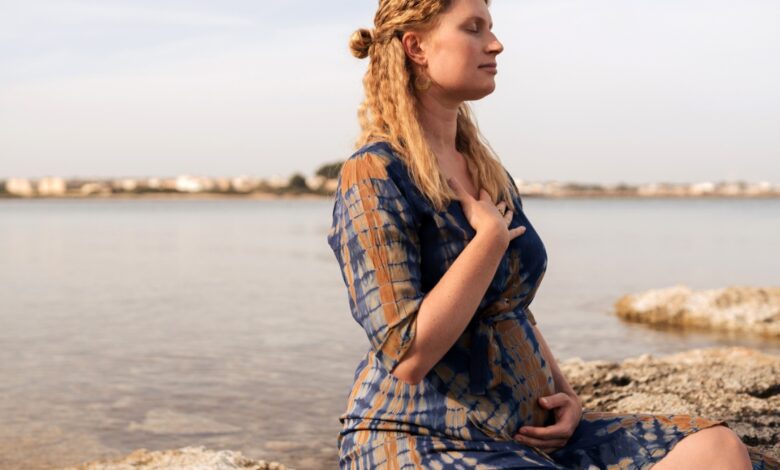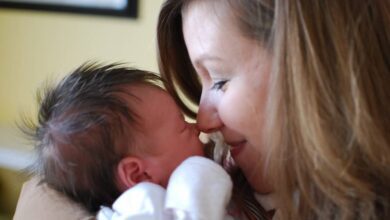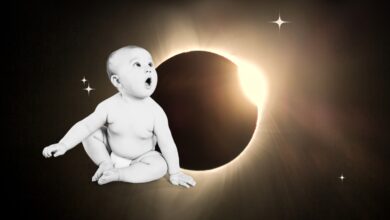Birthing an Ecological Self: Transition to Motherhood

I grew up with ducks, geese, peacocks, goats and gardens. Despite being close to the natural world, I can’t say I’ve maintained an intimate relationship with it other than enjoying the beauty and complaining about the more inconvenient aspects. That changed during pregnancy.
The culturally induced line that I was told separated me from the animal kingdom dissolved. The experience of being pregnant and going through the process of giving birth initiated my return to the wild unknown. I am a beast that brings another being from seed to human form. And, like most mammals, I became fiercely protective of my offspring. An old intelligence that sleeps until the pregnancy bursts out as if it’s already there, breathing softly beneath my so-called civilized self.
So began my journey into matrescence, the developmental transition into motherhood. Looking at my pregnant belly against the background of a sleepless city, I experienced a deep connection to my body, community and the natural world. Modern life did not prepare me for this transition. I don’t know how to be fierce. However, I was the kangaroo that carried its joey in a pouch made of its own skin. I am also a mammal, fully capable of managing the lives of other beings. As I thought of a kangaroo leaning on the sidewalk in a concrete jungle, I was perplexed. I like vibrant greens, fresh air and biodiversity. I need space to explore my own forest.
Research now suggests that Mother’s exposure to natural environments can promote healthy baby growth. It is well documented that spending time in nature or bringing nature into your daily life can improve physical and mental health. According to Edward O. Wilson’s biophilia hypothesis, an innate connection and interdependence exists between humans and more than humans that includes psychological wellness, personal identity, and a sense of belonging to something greater. greater than oneself. Connection with nature is especially important for the healthy development of a woman’s sense of self. It has been suggested that women who spend time in natural settings are more likely to maintain a healthy body image.
Gaining wider attention in recent years is the concept of the ecological self, or aspects of the self that capture the human ability to relate to other beings and the earth
itself. Dominated by dualistic opposition, nature and culture remain opposed and separate in the current western worldview, although this is beginning to unravel as it is more widely understood that dualism is inconsistent with the known laws of science. The self is a composite of the gifts we are born with and an ongoing process of relational development.
The ecological aspect of the self is a compilation of our relational, ongoing and iterative processes of transition in ecosystems. If we are embedded in the natural environment, and the natural environment (iegut bacteria) is embedded in us, it follows that the ecological self is an integral part of us. In many indigenous cultures, the realization of wholeness usually requires a rite of passage or process of transition from an isolated human-centered consciousness to an interconnected earth-centered consciousness. Not surprisingly, this change of development is what is necessary for the ecological sustainability of humanity.
Ecopsychologists argue in favor of connection with nature during matrescence. The process of developing an earth-centered consciousness can be accelerated during major life changes and begins with a consciousness of being embedded in a living world, setting the stage for an ecological self to emerge. Realizing that one is embedded in an animate world simply means accepting the possibility that everything is alive, including the Earth and its biological systems. Supportive containers are needed for mothers to heal human alienation from nature, and to redefine themselves along the ecological dimensions of experience.
This process can also support the mother’s health. Understanding the wild unknowns of human pregnancy and my place in the web of life might have been easier if I had been part of a supportive community of women to navigate the transition and rite of passage into being. mother
Sources
Clayton S, Opotow S, eds. Identity and the natural environment: The psychological significance of nature. Cambridge, MA: MIT Press; 2003:45-65.
Davis A, Athan A. Ecopsychological Development and Maternal Ecodistress During Matrescence. Ecopsychology. Sep 2023;15(3).
Jordon M. Nature and therapy: Understanding counseling and psychotherapy in outdoor space. Routledge; 2015.
Louv R. The last child in the woods: Saving our children from nature-deficiency disorder. Algonquin; 2008. Louv R. The nature principle: Reconnecting with life in a vital age. Algonquin; 2012. Louv R. Vitamin D: 500 ways to boost the health and happiness of your family and community. Algonquin; 2016.
Naess A. Self-Realization: An Ecological Approach to Being in the World. The Trumpeter: Journal of Ecosophy. 1987;4(3).
Swami V, Robinson C, Furnham A. Positive Rational Perception of Body Image Threats Mediates the Association Between Nature Exposure and Body Esteem. Ecopsychology. 2022;14(2):118-125.
Toda M, Avraam D, Cadman T, Fossati S, et al. Exposure to natural environments during pregnancy and birth outcomes in 11 European birth cohorts. Environment International. 2022; 170.
This story is part of The Motherly Collective contributor network where we showcase stories, experiences and advice from brands, writers and experts who want to share their perspective with our community. We believe that there is no single motherhood story, and that every mother’s journey is unique. By amplifying each mother’s experience and offering expert-driven content, we can support, inform and inspire each other on this incredible journey. If you are interested in contributing to The Motherly Collective please click here.





